When I think of pre-Code sleaze, Ralf Harolde’s is the first face I imagine. I love it when he has something more than a bit, such as his Piet Van Saal in William A. Wellman’s Safe in Hell (1931). Piet’s the louse that Gilda (Dorothy Mackaill) cracks with a bottle and leaves for dead as the hotel burns. He’s who sets her on the run. Harolde is so detestable in the part that we wind up getting a kick out of seeing him die all over again.
Or how about Picture Snatcher (1933), where James Cagney tries to go straight by sneaking photos for the newspapers. At the climax of the film Cagney catches up with his old running mate, Harolde’s Jerry the Mug, who’s hellbent on a wild shootout with the law and figures it’s a swell idea to keep his wife and kids nearby for leverage. Jerry the Mug is one of the most brutal bad men on film and it’s appropriate that his horrifying finish is punctuated by allowing us a chuckle of pure relief when Cagney snaps a shot of the Mug as he gasps his final breath.
In addition to Harolde’s effortless ability to always look like the least trustworthy man in any room, he’s also the go-to junkie of the black and white screen. He’s a master of twitching, snorting, and ticcing in titles like Night Nurse (1931) and Jimmy the Gent (1934), as desperate and low addicts ready to do anything for a buck. While David Landau makes a great junkie in Bedside (1934), nobody more consistently took advantage stealing a scene with a quick wipe of the nose or jitter of his cheek than Ralf Harolde.
Biographical information about Harolde is sparse, so much of what follows relies heavily on one source, Harolde’s home town Pittsburgh Press. The bits that could be cross-referenced do check out, so I’m willing to accept most of what follows as accurate. That article was published in 1931 and there isn’t too much about Harolde after that. I couldn’t even find an obituary, so expect this piece to thin out once we reach Hollywood.
He was born Ralph Harold Wigger in the Troy Hill neighborhood of Pittsburgh, Pennsylvania on May 17, 1899. The family belonged to the German Lutheran Church and Ralph’s parents, William and Margaret Wigger, wanted their son to become a minister. Young Ralph was a churchgoer, but he was more devoted to performing in church plays and other local amateur theatricals where he sang and played the piano. Upon completing grade school Ralph took work as a clerk in a local bank and attended night school at Allegheny High. He also worked as a secretary to the director of the Sarah Heinz House.
 There was a stock company playing the Empire Theater in local East End and teenage Ralph eventually worked up the nerve to ask the theater owner for an audition. The aspiring young actor was hired on at $15 a week and played his first speaking part in the comedy Officer 666 at the Empire in March 1917. Before the theater owner had the programs printed up, he suggested Ralph take on a catchier name and that’s when Wigger was dropped and he altered the spelling of his first and middle names. He was Ralf Harolde from that point forward and must have made it legal at some point because it’s the name that appears on all associated documentation for the rest of Ralf’s life.
There was a stock company playing the Empire Theater in local East End and teenage Ralph eventually worked up the nerve to ask the theater owner for an audition. The aspiring young actor was hired on at $15 a week and played his first speaking part in the comedy Officer 666 at the Empire in March 1917. Before the theater owner had the programs printed up, he suggested Ralph take on a catchier name and that’s when Wigger was dropped and he altered the spelling of his first and middle names. He was Ralf Harolde from that point forward and must have made it legal at some point because it’s the name that appears on all associated documentation for the rest of Ralf’s life.
Ralf Harolde continued with the Empire Theater until the Great War interrupted his blossoming career. According to the Pittsburgh Press article, Ralf enlisted in the Marines and trained for seven months at Parris Island, South Carolina, but wasn’t scheduled to ship out to Europe until November 15, four days after the war ended. That’s possible, though Ralf didn’t register for the draft until September 12, so I don’t quite see how the seven months training would have been possible. On that same draft registration Ralf also listed his employment, not as actor, but time-keeper for I.H. McGill, a Pittsburgh construction company. At any rate, with the war over Ralph went back to his previous stock company, which was now calling itself “The Pershing Players.” He soon departed for New York, hoping to make it big on Broadway.
The Internet Broadway Database has no record of Harolde ever appearing on Broadway, so he was likely on the road when he played a part in The Only Way, which in turn landed him a three-year contract with William Francis Barry’s Wilkes-Barre, Pennsylvania stock company. He began as a character man with Barry’s company, playing everything from juveniles to old men, but Harolde was elevated to leading man by the end of his second season with the troupe. It was also during this period that he made his film debut sharing scenes with, of all people, Babe Ruth in Heading Home (1920).
Harolde’s silent film experience was limited to this role and a part in a 1922 independent production, Sunshine Harbor. Both of those films are mentioned in the 1931 Pittsburgh Press article, but the IMDb additionally credits Harolde with a bit role in 1927s Babe Comes Home. I suspect somebody may have confused that with Harolde’s earlier appearance opposite the Babe in Heading Home. If not, I’d be curious to know more about Ralf Harolde’s relationship with the Sultan of Swat!
Following his time with the Wilkes-Barre players, Harolde went to Columbus, Ohio, where he was a leading man for three years. In Columbus he married a Catherine Cornell (not her), who also became his business manager. The Harolde’s moved to Omaha, Nebraska, and then Lincoln, where Ralf continued to work until he was discovered by David Belasco, who gave Ralf his breakthrough role in the Pacific Coast touring company of The Front Page. The play ran for 26 weeks in Los Angeles and resulted in Ralf being offered contracts by three different movie studios.
The next phase of his career began and Ralf Harolde became a constant presence on movie screens in those early years: he appeared in six features in 1930; eight in 1931; four in 1932, eight in 1933; etc. He was kept busy through mid-1937, timing that seems to agree with this assessment of his involvement in Monroe Owsley’s death. I couldn’t find any additional source material to back that up, but I did bump into this even more disturbing item, which saw Harolde arrested on suspicion of kidnapping a seven-year-old boy. Thankfully, he was soon cleared and forgiven by the boy’s mother, but it’s hard to imagine the incident didn’t cause a stain.

Above: Harolde with John Halliday in The Witching Hour.
Now, I don’t know what happened to Mrs. Harolde during the 1930s—and to be completely honest, I could find no record of her beyond the 1931 Pittsburgh Press article, which never mentions a split—but there’s no doubt that Ralf married (again?) on November 18, 1940. The 41-year-old actor married Danette Lloyd Durham, who turned 24 just a week after the wedding. As there is very little published information about Ralf Harolde’s later life, I can’t say how long the two stayed together, though Danette did list herself as married when enlisting in the Women’s Army Corps in June 1943.
In 1941 Ralf Harolde resumed his movie career and remained as busy throughout the remainder of that decade as he had been in 1930s. He falls out of view throughout most of the ‘50s, but shows up on television in series such as Mike Hammer and The Untouchables (where he’s billed as “gangster”) and made two final movie appearances in small unbilled roles in The Rise and Fall of Legs Diamond (1960) and A New Kind of Love (1963).
His peak was short and his parts were often small, but Ralf Harolde always made them memorable. Beyond a smattering of coverage from his hometown newspaper upon making his first mark in Hollywood, Ralf Harolde remains a rather mysterious figure. A few threads of his existing biography hint that this may have been for the best, though neither of these items seem concrete. One thing we can be sure of, thanks to the public record, is that Ralf Harolde died November 1, 1974 at age 75. The IMDb adds that Harolde died of pneumonia in Santa Monica, though the way I read these records indicate that while he last resided in Santa Monica, Harolde died in Los Angeles.
“I don’t mind dying in a picture,” says Ralf. “But I’d like to be given the opportunity to die just once under circumstances which would permit the audience to be at least indifferent about my death, instead of being glad about it.” —Boy’s Cinema, June 6, 1936.

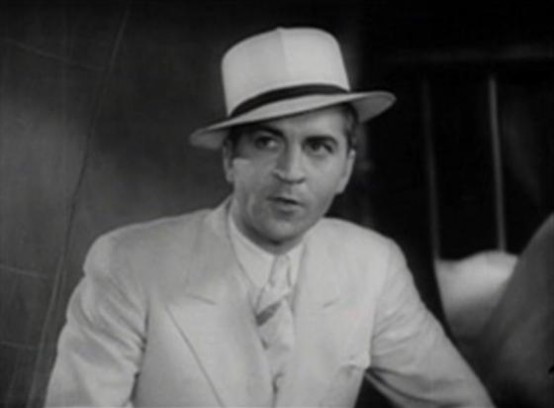
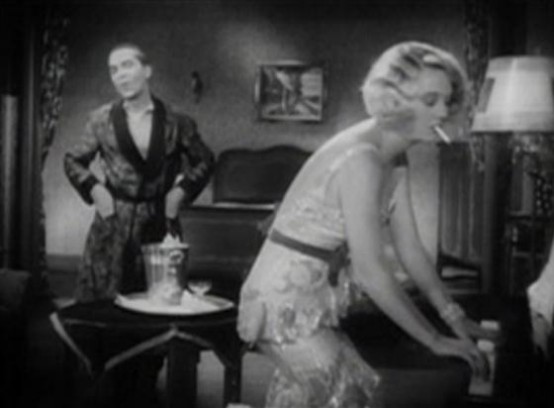
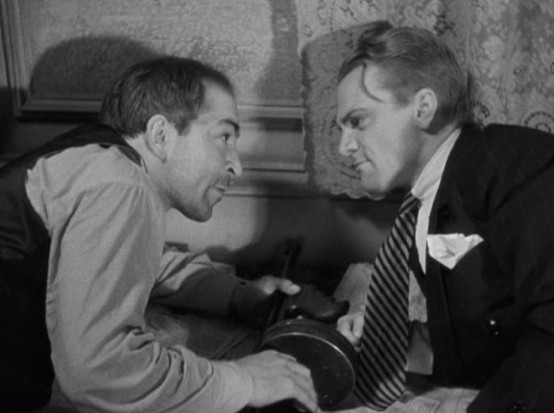

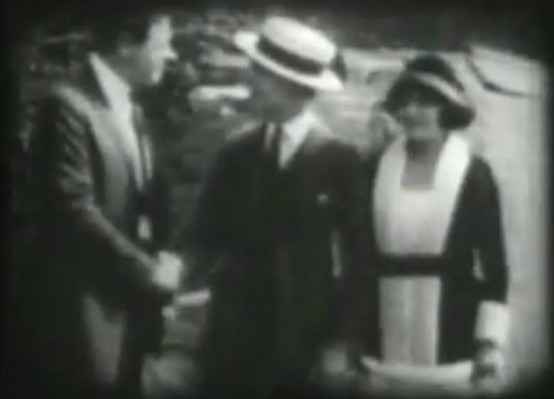


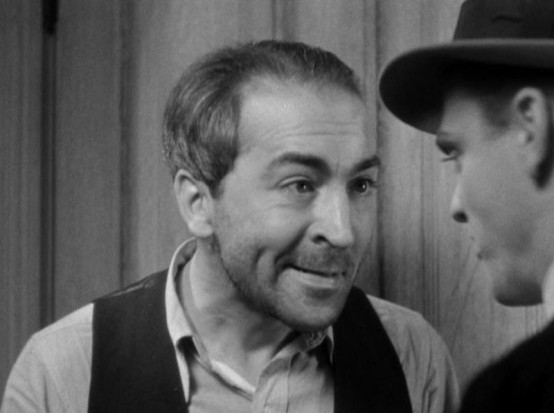

Thanks for this article about this interesting character actor whose bit I enjoyed in the sea wolf.
Glad you enjoyed it, Ron! Thanks for taking time out to say so!
Wow, this is interesting for me to see. I am one of Ralf’s relations, John Wigger. As I write this, Houston is flooding. The Alley Theatre in their theatre is particularly hard-hit. We have a signed playbill from a play that Ralf starred in at this theatre (albeit in a different location) from the mid 1950’s. This was obtained when my Grandfather took his family across country from the Pittsburgh PA area to visit California. They visited his cousin Ralf and heard some good stories. Ralf also read aloud a section of a play he had recently written.
Ralf was good friends at the time with Roscoe Karns, who was the star of an early TV show, “Rocky King, Detective” (1950-1954). He was the best man in Roscoe’s wedding.
Hey, John, thanks for taking time to comment and provide a little more info about Ralf Harolde—I love his film work, the man could really play a heel and he had a great way of subtly getting across little character tics (I can’t even picture him without thinking of him taking a little swipe at his nose to note a drug problem!). I hope you’re okay down there and that Houston recovers soon. I’ve really come to despise hurricane season after seeing a little too much of it in recent years here on Long Island. Thanks again, really appreciate the little nugget about Ralf’s being pals with Roscoe Karns!
Well done article, very helpful. I am doing research on a Great Aunt, Georgie Wheeler, who the family has photo of her and Ralf, 1940s. She passed in 1972 and was understood to have been married to Ralf.
It was in the LA Times, and Lincoln Journal Star, June 22, 1934, that character actor Ralf Harolde and Georgia Wheeler, 25 years old, Hollywood, went away to Yuma Arizona where they were married.
Thank you for this article. I looked up Ralf Harolde after seeing him today in Night Nurse on TCM. What a sleaze!